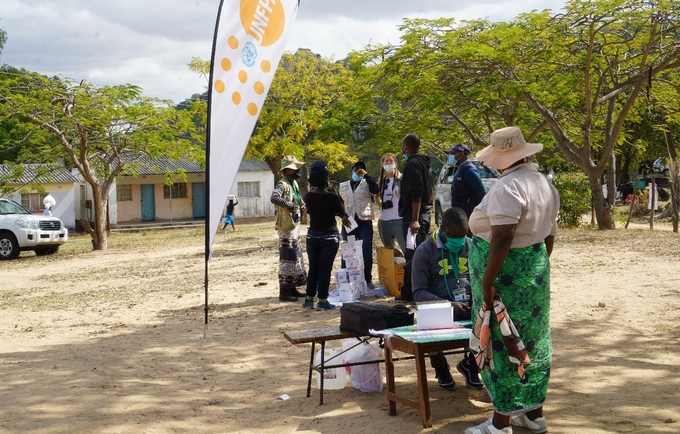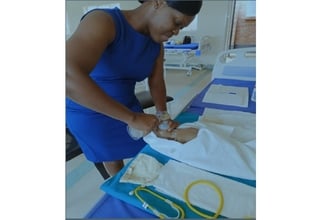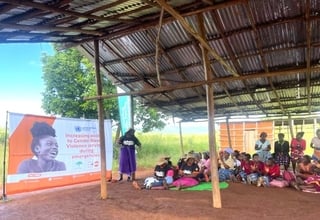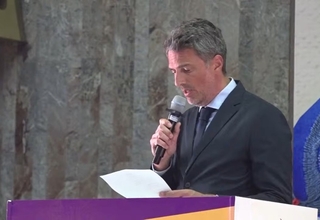Mutare, 27 July, 2020 – Charity Fabeni (35) is one of the beneficiaries of the World Food Programme food distribution exercise in Kamutanho village in Mutare district, about 400 kilometres outside Zimbabwe’s capital, Harare. On a monthly basis she makes the 2 kilometre trip to the food distribution point at Kamutanho school to receive her ration. On one of her monthly visits and much to her delight, Fabeni learnt she could now collect condoms at the food distribution point.
“My husband and I had to use condoms to prevent pregnancy for 3 weeks after we couldn’t get family planning pills during the COVID lockdown from our local clinic. I have 6 children and the thought of getting pregnant really stressed me,” explains Fabeni.
Fabeni is one of the women who has benefitted from the partnership involving the Ministry of Health and Child Care, the United Nations Population (UNFPA) and the World Food Programme (WFP) in the distribution of male and female condoms, provision of information on Sexual Reproductive and Health Rights (SRHR) at food distribution points in Manicaland Province. This information dissemination includes sharing of various family planning IEC materials and educational sessions on issues such as family planning, Gender Based Violence and COVID-19 prevention. Local public health facilities and community health workers are involved in the initiative.
WFP has a standing arrangement with the Government of Zimbabwe for distribution of food with over 1,500 food distribution points, covering 311,157 households in 60 districts, mainly over the lean season, before the next harvest. Utilising these food distribution points for essential and life-saving SRHR services, including male and female condom distribution and dissemination of information on SRHR, facilitates increased access for communities beyond health facilities. With the COVID-19 lockdown and travel restrictions associated with it, many people, particularly women and girls are finding it difficult to access basic health services.
Early this year, UNFPA supported the Ministry of Health to conduct a Rapid Assessment of COVID-19 Response in the Context of Maternal and Sexual and Reproductive Health in Zimbabwe. The assessment sought to find Zimbabwe’s preparedness to offer antenatal, delivery and post-delivery care to pregnant women infected by COVID-19. It also assessed potential impact on the provision of other sexual and reproductive health services. The assessment showed that the COVID-19 outbreak has affected women and young people’s access to sexual and reproductive health services.
In light of the impact of COVID-19, UNFPA reprogrammed its work to come up with initiatives to ensure continuity in the provision of other sexual and reproductive health services. The partnership with WFP is one such initiative. Through the support of Health Development Fund (HDF) partners funded, the Governments of Britain, Ireland, Sweden and the European Union UNFPA is able to make a difference in the lives of women such as Fabien and bringing sexual and reproductive health services closer to communities. Under HDF support, UNFPA is providing male and female condoms, contraceptives and sexual reproductive health information during these food distribution outreaches. Community health workers such as Behaviour Change Facilitators, Village Health Workers and young condom promoters, are providing information on SRHR such as family planning, HIV, male and female condom usage and Gender Based Violence at the food distribution points.
Hellen Jabwa Bishau, a village health worker since 2013, has welcomed the initiative and suggested that the initiative be expanded to include contraceptive pills.
“In our area we have some men who, for religious or other reasons do not want their wives to use modern family planning methods such as the pill. Women in these unions then find it difficult to go to the clinic for family planning services,” said Bishau. “Having pills distributed at these food points and in the community by us community health workers, would then provide an avenue to reach out to these marginalized women. If we are allowed to assist with distributing pills, we know how best to reach out to these women.”
Plans are underway to continue and scale up awareness raising and basic service provision appropriately through this approach of integrating food distribution with materials and information on other SRH concerns including cervical cancer as well as obstetric fistula. The feasibility of providing outreach clinical services at some of the food distribution points is also being explored as some of the women have to walk up to 20km, to and from their nearest clinic to access such reproductive health services.
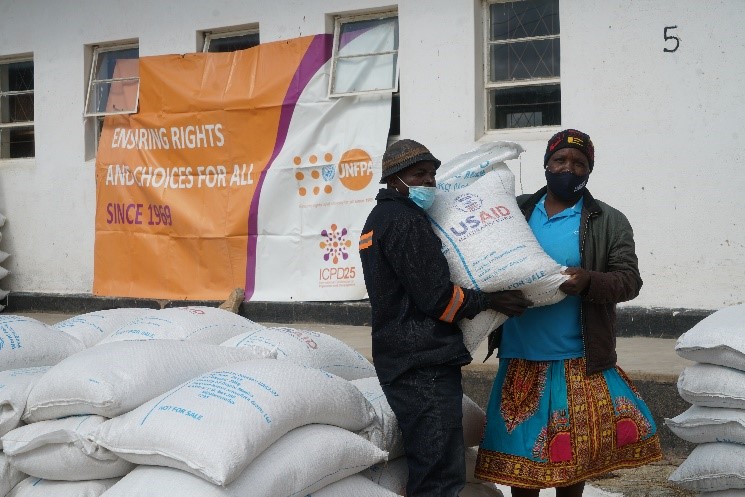
“Food distribution points are deep in the communities and in close proximity and reach to the general population, making them easier and more convenient for communities to access essential and life-saving SRHR service, including availing condoms that are key for preventing unintended pregnancies and HIV/STI infection prevention and transmission,” said WFP Zimbabwe Representative and Country Director Eddie Rowe. “It is in the spirit of delivering as one UN and maximising on already existing platforms deep in the communities for the benefit and welfare of the general public. This initiative enables efficient use of resources. Sustainable Development Goal 17, on partnerships, is enhanced, realised through this collaboration."
Although the distribution of food is mainly for the lean period, in in some districts, it may extend beyond this period because of the envisaged poor harvest anticipated this year, thus widening the scope for greater collaboration.
“To date 1,8 million male condoms and 88,000 female condoms have been moved from Natpharm to WFP for onward distribution through these channels,” said UNFPA Representative Dr. Esther Muia. “This partnership builds on the existing UNFPA, WFP Memorandum of Understanding (MOU) for supply of food to Maternity Waiting Homes where pregnant women, mainly those at obstetric risk, are housed towards their delivery date at a health facility for close monitoring.”
The joint WFP and UNFPA partnership on maternity waiting homes program provides a food basket (cereal, pulse, oil and super cereal) to waiting mother’s shelters in four provinces (Matabeleland North, Matabeleland South, Manicaland and Mashonaland Central). Also, earlier in February, WFP in collaboration with UNFPA, distributed Meals Ready to Eat (MRE) to pregnant and lactating women, registered as part of the general distribution in Rushinga.
– By Bertha Shoko with additional reporting by Dr. Edwin Mpeta Programme Specialist, Reproductive Health
